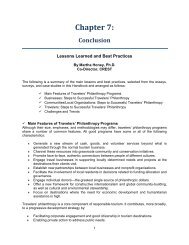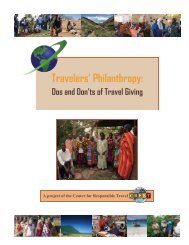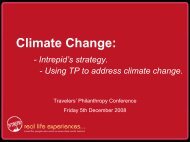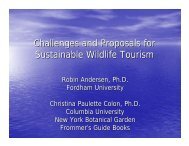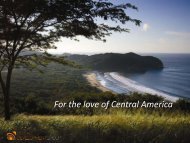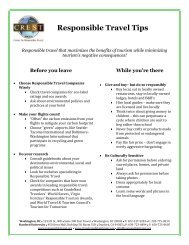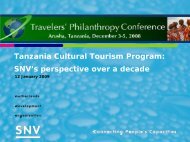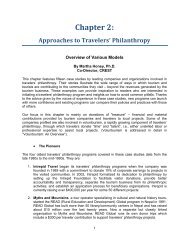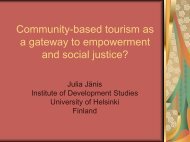Travelers' Philanthropy Handbook - Center for Responsible Travel
Travelers' Philanthropy Handbook - Center for Responsible Travel
Travelers' Philanthropy Handbook - Center for Responsible Travel
You also want an ePaper? Increase the reach of your titles
YUMPU automatically turns print PDFs into web optimized ePapers that Google loves.
greater interest and attention to detail than the way I observe them. What do they see in me?They see an agent of radical change, an ambassador (despite myself) of a high-consumptionlifestyle beyond their wildest dreams. I might consider myself an ecotourist, wanting to liveclose to the land. But this self-image is self-deceptive. The inescapable fact is that I may beseveral hundred times wealthier than those living in the country I’ve gone to visit, and theconsumption lifestyle my income makes possible - with its accompanying heavy demand on theearth’s resources - is outlandishly high by village standards. I might see myself as anindividual. But in fact I am an agent of the vast, impersonal phenomenon we call globalization.Someone in the village is carefully observing my hiking shoes, khaki pants, nicely tailored shirt,sunglasses, sun hat, and camera with its telephoto lens and thinking, enviously, “I wish I hadthose things. They’re good looking, they’re convenient, and having them would make myneighbors look up to me.” Someone is observing the bus or minivan that brought me to thevillage and thinking, enviously, “Wouldn’t it be nice to travel that way and not walk or ride abicycle when I want to move around?”These thoughts accentuate the drive <strong>for</strong> change in that culture, the drive to be like me, toabandon aspects of the culture that are the very things that attracted me to visit that culture.The same thing applies to nature. It took a great deal of energy, with a lot of trees felled, tobuild the road to the ecotourism lodge where I’m staying. Heavy trucks regularly take importedwines and beer up that road to the lodge. And then there’s the substantial contribution to globalwarming from the jet fuel that took me from the U.S. or Europe to a land thousands of milesaway. The per-person costs to the environment of transcontinentaltourism are huge. If I consider myself anenvironmentalist – and many tourists do -- this is disturbingin<strong>for</strong>mation I just don’t want to hear about.• The Law of Unintended ConsequencesSo the reality is that to experience “unspoiled” indigenousculture and “unspoiled” nature, I have to become an activeparticipant in spoiling indigenous culture and the naturalenvironment. I cannot escape being an agent of changeeven if I see myself as an agent of the status quo. In sucha paradoxical situation, it’s easy <strong>for</strong> my intentions not toproduce the results I have in mind. In fact, my profoundmisunderstanding of my own impact on the local settingand of how I am perceived provides the optimal opportunity Village in Malawi. Credit: Khym Photos<strong>for</strong> the law of unintended consequences to operate. Thatlaw can operate in any interaction among humans. But it’s especially likely to apply wheninteractions cross cultural and linguistic lines, and even more so when basic misunderstandingsof the self and of others are at play, as they are in this situation.Secondly – and to turn the paradox on its head – I see my charitable actions as agents ofchange, but those actions may be opposed by influential local people who want to maintain thestatus quo.Let me give an example. My goal in contributing money <strong>for</strong> a well, maternity clinic, school,rabbit hutch, piggery, drip irrigation project, bridge, etc. is to change the local situation. The181




